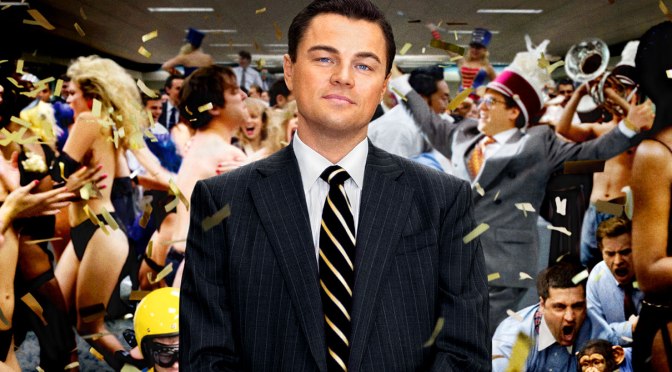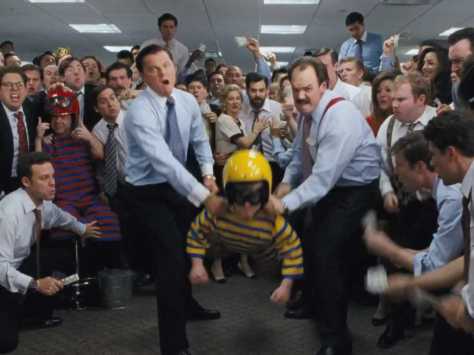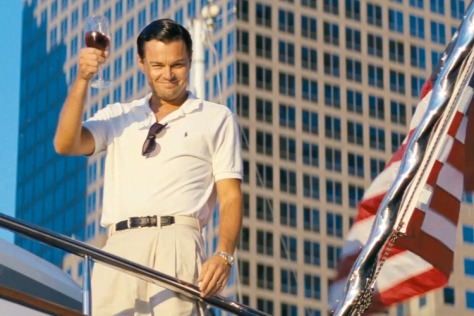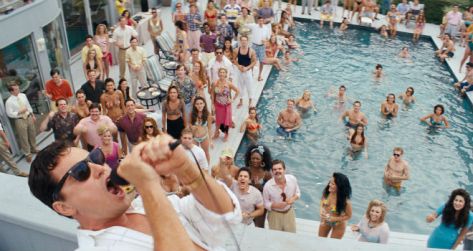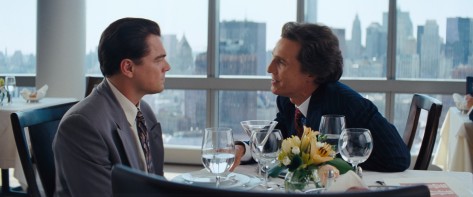The very first scene of ‘The Wolf of Wall Street’ features a midget (that’s how they’re described by the characters, so I’m going with it) being thrown at a large target in a game of ‘closest to the bull wins’; as an opening gambit in a film all about excess, that’s setting the bar extremely high for what has to follow. To his credit, Scorsese succeeds in doing so, providing an 180 minute orgy of money, fast cars, hard drugs…and orgies.
The midget throwing is one of a number a remarkable spectacles to be had at the offices of Stratton Oakment as employees toast the end of the each working week, and there at the centre of the action stands the master of all ceremonies, a man shortly to be infamously christened ‘The Wolf of Wall Street’ in a Forbes magazine exposé, and the subject of this biopic, Jordan Belfort (Leonardo Di Caprio).
Scorsese’s film concentrates on Belfort’s meteoric rise from his lowly beginnings at L. F. Rothschild in 1987 to has status as the most talked about, in demand and filthy rich broker in Wall Street, and then his inevitable fall as his many illegal schemes lands him a prison sentence and $110m repayment bill for securities fraud and money laundering just over a decade later.
In many quarters the film has received hostile press, the recipient of damning criticism on the grounds of glamourising the lifestyle of Belfort, celebrating the man and reveling in his tasteless indulgences. The argument is the story should take a moral standpoint and concern itself with the consequences of Belfort’s actions and represent the victims of the dealings rather than concern its focus only on the victor. From my perspective, I consider the viewpoint both reactionary and invalid.
While it’s true that ‘The Wolf of Wall Street’ is all about the high life and not about the cost, it’s not a film nails its colours vehemently to the ‘Greed is Good’ banner. By no means does Scorsese shy away from bringing us all the excess, indeed he saturates the screen with it, almost battering the viewer into submission. But while the film is happy to show everyone one hell of good time, the camera is impassive rather than fawning in it’s judgement of Belfort, while Di Caprio ably showboats the undoubted charisma of the man, his lack of morality, his all-encompassing greed and the irrepressible arrogance that is ultimately his undoing are also explicit throughout.
The result is a film that leaves any character judgement down to the viewer and gives the character of Belfort ample room and rope with which to hang himself – it’s abundantly clear that long before his comeuppance, that Belfort is fulling deserving of everything he gets; the very select few who do benefit his wealth are strictly limited to his closest associates, fed incentives to work harder, declare their undying loyalty and feed his ego and need for popularity. As for the rest of the world? Well, first the poor, then the rich and finally the law – they can all go fuck themselves.
It may be tempting to compare ‘The Wolf of Wall Street’ to ‘Goodfellas’, being as it is, Scorsese’s previous benchmark ‘rags to riches’ biopic, but Henry Hill was a far more sympathetic character, seduced by the mob as a child, hopelessly trapped, and ultimately desperate to save his own skin by the time the FBI arrive on the scene. When the FBI offer Belfort a way out, a deal of a lifetime, humility is crushed under the weight of his ego – by then, any lingering grounds for any degree of character redemption are forsaken.
If anything, the film has more in common with Brian De Palma’s ‘Scarface’, another story of a man who becomes an abomination, driven by an all-consuming need for money and power, corrupted and betrayed by his own, hopelessly out of control ego and ambition. Come the closing scenes, it’s almost inconceivable that most of the audience wouldn’t rooting for the authorities.
So the controversy aside, is it any good? Well, Di Caprio is captivating in the role, supplementing his natural charm with outbursts of manic intensity and some brilliantly acted ‘under the influence’ scenes, further reinforcing those who subscribe to the ‘new De Niro’ school of thought. Jonah Hill meanwhile, all white teeth and bullshit, has understandably received Oscar recognition for his supporting role. There are also a few other notable turns amongst things, Rob Reiner as the father and Cristin Milioti as Belfort’s first wife bring a semblance of a judgmental tone to Belfort’s activities, while Matthew McConaughey steals the opening half hour as the spiritual mentor.
As for the movie itself, it’s perhaps quite fitting that the main failing of ‘The Wolf of Wall Street‘ is down to its own excesses; a 3 hour running time is very hard to justify, especially from a man whose most celebrated biopics, ‘Goodfellas‘ and ‘Raging Bull‘ clocked in at over 30 minutes and over 50 minutes less, respectively. Ultimately, Scorsese‘s film is a little too indulgent, a little too excessive, a little bit too indisciplined – with a little more economy of storytelling and maybe a few of the many hedonistic flights of fancy delivered through montage, rather in full unedited splendour, we might just have had Scorsese’s best work since at least Casino.
As it is, film maker, much his like subject, has failed to curb his own excesses and has ended up with his fingers burned.
★★★½
Adam
